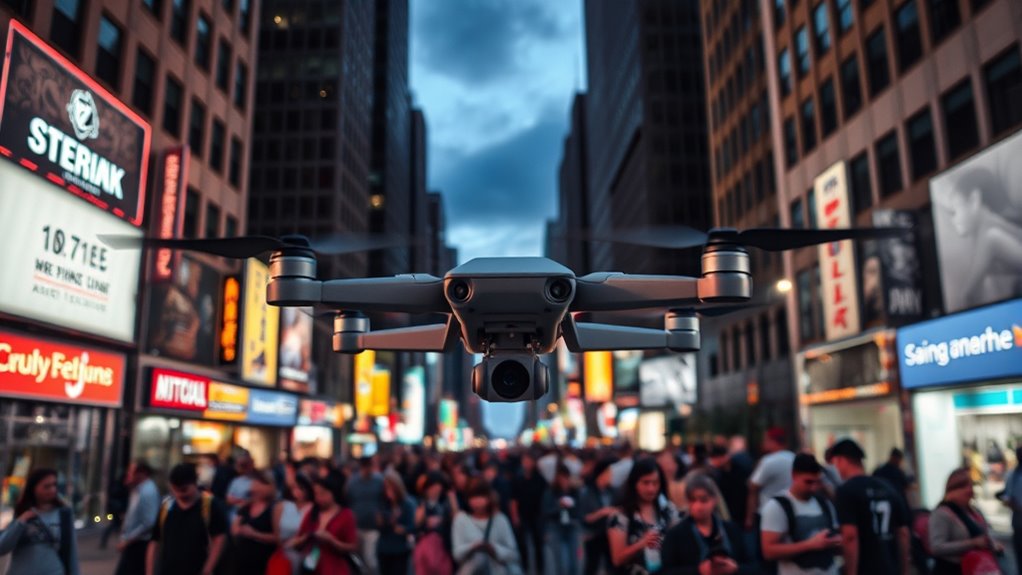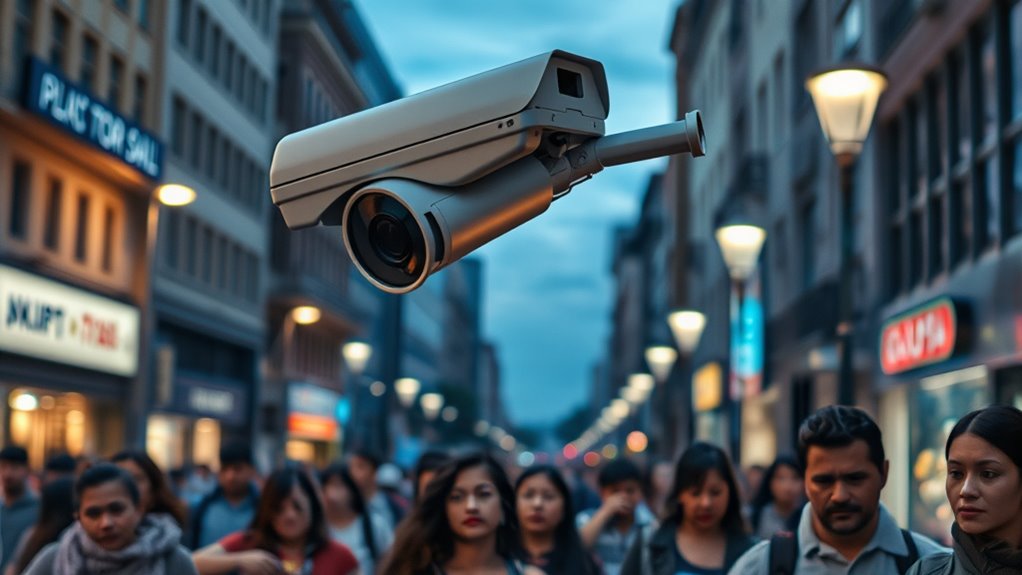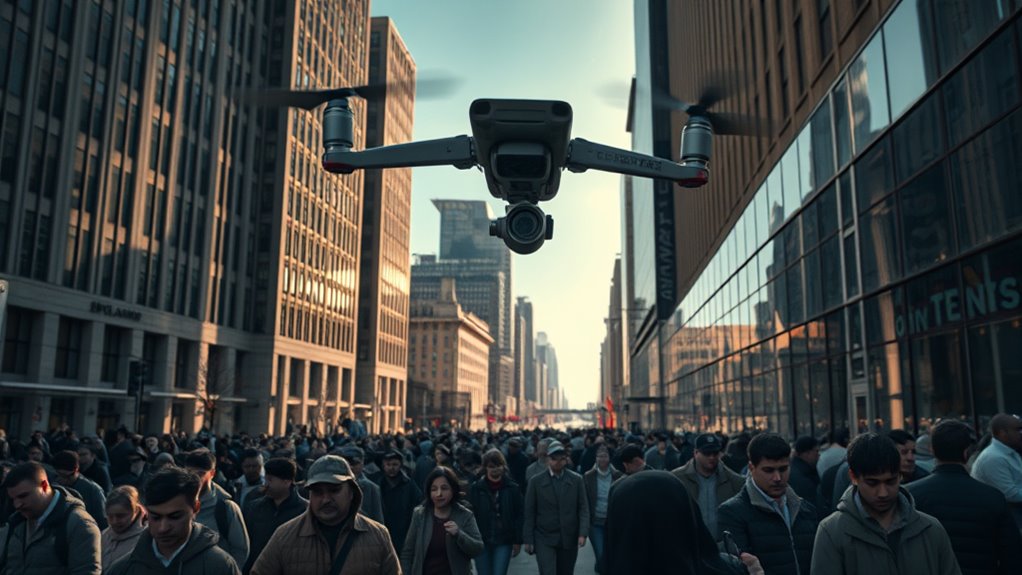AI surveillance can boost security by detecting threats and streamlining response times, but it raises privacy concerns. You might feel uneasy knowing these systems collect personal data, and algorithmic bias can lead to discrimination. Transparency and ethical guidelines are crucial to balance security interests with individual rights. When these systems fail, accountability becomes an issue. Understanding these complexities can help you navigate this evolving landscape and consider the implications for yourself and society.
Key Takeaways
- AI surveillance enhances security through real-time threat detection but raises significant privacy concerns regarding personal data collection and usage.
- The use of facial recognition technology in public spaces can threaten individual privacy and civil liberties.
- Algorithmic bias in AI systems can lead to discriminatory outcomes, further complicating the balance between security and privacy.
- Regulatory frameworks, like the EU AI Act, aim to ensure transparency and accountability in AI surveillance practices.
- Public engagement and ethical guidelines are essential for navigating the complex intersection of security needs and individual rights.
The Role of AI in Enhancing Security

As technology evolves, you'll find that AI plays a crucial role in enhancing security systems. By analyzing video feeds in real-time, AI boosts threat detection capabilities, quickly identifying unusual patterns or behaviors. Its advanced algorithms recognize specific objects and behaviors, enabling immediate action against potential threats. With automated alerts, AI ensures security teams can respond swiftly to incidents. Moreover, AI excels at anomaly detection, spotting abandoned objects or suspicious gestures that human operators might miss. By automating routine monitoring tasks, AI reduces the workload for personnel, allowing them to focus on critical decision-making. This improved operational efficiency leads to cost savings and enhances overall security, making AI an invaluable asset across various industries, particularly in enhancing public safety.
Understanding Privacy Implications

While AI surveillance offers enhanced security, it also raises significant privacy concerns that can't be overlooked. These systems collect vast amounts of personal data, including biometric information, which can be susceptible to breaches. Technologies like facial recognition monitor individuals in public spaces, threatening privacy and civil liberties. Additionally, AI can perpetuate biases if trained on flawed data, leading to discriminatory outcomes in critical areas like law enforcement. The lack of transparency in how data is collected and used complicates your awareness of when you're being monitored. Furthermore, the high volume of collected data increases the risk of data breaches and unauthorized access. Continuous advancements in algorithms enhance predictive capabilities in AI surveillance systems, which can further exacerbate privacy issues. Finally, the challenge of creating effective regulations to balance security with privacy rights remains a significant hurdle as AI surveillance becomes more prevalent in society.
Ethical Challenges in AI Surveillance

Though AI surveillance promises enhanced safety and efficiency, it also presents numerous ethical challenges that demand our attention. You mightn't realize that algorithmic bias can lead to discriminatory outcomes, perpetuating existing inequalities. Additionally, the lack of transparency about how these systems operate can leave you in the dark regarding data usage. Privacy concerns arise when vast amounts of personal information are collected without your consent. There's also the risk of misuse by authoritarian governments, which can exploit these technologies for social control. Finally, accountability issues complicate matters, as it's often unclear who's responsible when AI surveillance goes awry. Addressing these challenges is crucial to balancing security and fundamental human rights, as strong governance is necessary to ensure ethical AI usage.
The Impact of Technological Advancements

Technological advancements in AI surveillance are revolutionizing how we approach security, making systems smarter and more efficient.
With AI-powered video analytics, you can analyze video feeds in real-time, detecting threats like unauthorized access or suspicious behavior instantly. Additionally, AI-driven surveillance systems can significantly reduce false alarms by differentiating between normal and abnormal events.
Facial recognition technology enhances your monitoring capabilities, identifying individuals in high-security areas.
Predictive analytics allow you to anticipate potential security threats, enabling proactive measures.
Autonomous drones automate surveillance tasks, providing real-time insights in large or remote spaces.
Cloud integration boosts data processing, enhancing your monitoring effectiveness.
Regulatory Frameworks and Compliance

As AI surveillance technologies evolve, the need for robust regulatory frameworks and compliance measures becomes increasingly critical.
The EU AI Act, effective from August 2024, classifies AI applications by risk, banning those deemed unacceptable, like mass surveillance. Transparency is key, requiring lower-risk systems to inform users when they're interacting with AI. The emergence of 5G networks and quantum computing will further accelerate data growth, making the need for regulation even more pressing.
The EU AI Act, effective August 2024, prioritizes risk classification and mandates transparency for AI interactions.
In the US, regulatory efforts are more fragmented, with over 120 AI-related bills under consideration, focusing on voluntary guidelines. While the GDPR influences data protection, its application to AI surveillance raises questions.
Ethical frameworks emphasizing accountability and impact assessments are vital to ensure fair treatment, especially for vulnerable communities.
Ultimately, creating effective compliance mechanisms is essential to navigate the complex landscape of AI surveillance.
Balancing National Security and Individual Privacy

While national security measures often rely on advanced AI surveillance technologies, this reliance can directly conflict with the fundamental privacy rights of individuals. You may find that these AI tools, like facial recognition and predictive policing, enhance security but raise serious privacy concerns. As you navigate this landscape, it's crucial to recognize that privacy rights must be upheld even in the name of safety. Ethical challenges arise, particularly regarding algorithmic bias that can lead to discrimination. Different countries tackle this balance in varied ways, reflecting distinct legal frameworks. Ultimately, finding a middle ground is essential, ensuring that national security doesn't come at the cost of eroding individual liberties. The need for justifiable data collection for security purposes underscores the importance of maintaining this delicate balance. Your awareness and engagement in this issue can help shape future policies.
The Importance of Transparency and Accountability

Transparency and accountability are essential for fostering trust in AI surveillance systems, ensuring that individuals feel secure about how their data is used and decisions are made.
Transparency involves making AI decision-making processes understandable, which builds trust between you and the technology. However, achieving this isn't easy due to the complexity of these systems and the lack of universal standards. Techniques like explainable AI (XAI) can help clarify decisions. Furthermore, legal frameworks are vital in establishing guidelines that enhance transparency in AI governance.
Transparency in AI decision-making is crucial for trust, yet its complexity and lack of standards pose significant challenges.
Accountability requires defining clear roles for stakeholders and conducting regular audits to align AI outputs with ethical principles. Independent oversight is critical in enforcing these standards.
Ultimately, by promoting transparency and accountability, you empower individuals to understand and engage with AI systems, fostering a more ethical environment.
Addressing Bias and Discrimination in AI Systems

Bias and discrimination in AI systems pose significant challenges that impact fairness and equity in society. When AI algorithms are built on biased data, they can lead to discriminatory outcomes, such as racial misidentification in facial recognition technology. This bias often stems from data collection practices that amplify societal inequalities, particularly affecting marginalized groups. For instance, the COMPAS algorithm has faced criticism for predicting higher recidivism rates for black defendants, while healthcare algorithms have favored white patients. These examples illustrate how AI bias can have profound implications for various sectors. To combat these issues, it's crucial to ensure diverse and representative data sets, implement regular audits, and develop explainable AI models. Establishing ethical guidelines can further help prevent discriminatory practices and promote accountability in AI development.
Future Innovations in Privacy-Preserving Technologies

As the demand for data privacy grows, innovative privacy-preserving technologies are emerging to safeguard personal information while still enabling valuable insights.
Data minimization techniques help reduce the risk of breaches by collecting only necessary data, while AI systems monitor broad areas rather than personal spaces. Access controls are also critical for ensuring that only authorized personnel can view sensitive footage, further enhancing privacy measures.
Edge AI processes data locally, enhancing privacy by limiting centralized storage and reducing identity exposure.
AI-driven privacy-enhancing technologies, like differential privacy and federated learning, enable organizations to analyze data without compromising privacy.
Frameworks such as TensorFlow Privacy and OpenMined support secure machine learning practices, ensuring compliance with regulations like GDPR and CCPA.
These innovations not only protect individual rights but also foster trust in AI applications.
The Need for Continuous Oversight and Ethical Guidelines

The rapid development of privacy-preserving technologies highlights a pressing need for continuous oversight and ethical guidelines in AI surveillance. You must recognize that the extensive collection of personal data often invades privacy and frequently lacks explicit consent from individuals. It's critical to address algorithmic bias that can lead to unfair treatment of specific groups. Establishing AI-specific regulations and strong enforcement mechanisms is essential for accountability and compliance. Moreover, ethical guidelines should prioritize fairness, transparency, and human rights considerations. Your role in advocating for public engagement is vital, ensuring that surveillance practices are proportional to security needs while maintaining trust and transparency. AI systems automate tracking and monitoring, increasing operational efficiency, which further underscores the importance of balancing security interests with individual rights in navigating this complex landscape responsibly.
Frequently Asked Questions
How Can Individuals Protect Their Privacy in Public Surveillance Areas?
To protect your privacy in public surveillance areas, start by using privacy-enhancing tools like VPNs and search engines that don't track you.
Minimize the data you share, only providing what's necessary. Consider using devices that process data locally to reduce storage risks.
Stay aware of who's access to surveillance footage, and advocate for transparency reports from authorities to ensure accountability.
Taking these steps can help you maintain your privacy while navigating public spaces.
What Are the Potential Consequences of AI Surveillance Misuse?
If AI surveillance is misused, you might face serious consequences like unlawful monitoring and loss of privacy.
It can lead to targeted oppression and reinforce societal biases, affecting marginalized groups disproportionately.
Without proper oversight, your civil liberties could erode, creating a surveillance state.
Additionally, the lack of consent in data collection can undermine public trust, making you feel vulnerable and anxious about how your personal information is being used.
How Does AI Surveillance Affect Marginalized Communities Specifically?
Did you know that facial recognition systems misidentify people of color up to 34% of the time?
AI surveillance significantly impacts marginalized communities by perpetuating bias and discrimination.
These technologies often rely on flawed data, leading to over-policing and unequal treatment.
When surveillance systems target specific neighborhoods, they exacerbate existing social divides, making it harder for marginalized individuals to access essential services and live without the fear of unjust scrutiny.
What Types of Data Are Most Commonly Collected by AI Systems?
AI systems collect various types of data to function effectively.
You'll find text data from web pages and documents, image data for tasks like facial recognition, and audio data to enhance speech recognition.
Video data is crucial for analyzing motion, while transaction data helps identify fraud.
Are There Alternatives to AI Surveillance That Respect Privacy?
You might feel overwhelmed by the digital landscape, but there are delightful alternatives that respect your privacy.
Consider using privacy-focused search engines like DuckDuckGo or secure browsers like Brave, which keep your data safe.
Opt for decentralized storage options like Nextcloud, and explore secure email services such as ProtonMail.
Conclusion
As we navigate the complex landscape of AI surveillance, it's crucial to strike a balance between security and privacy. You wouldn't want a Big Brother peering over your shoulder all the time, right? Emphasizing transparency, accountability, and ethical guidelines can help ensure that technology serves us without infringing on our rights. Let's embrace innovations that prioritize privacy while keeping us safe, because in this digital age, we deserve both security and respect for our personal freedoms.









